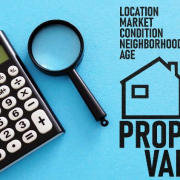Home Inspections vs Home Appraisals
What’s the Difference Between a Home Inspection and a Home Appraisal?
If you’re in the market for a new home, the terms “home appraisal” and “home inspection” are more than likely to come up at some point as you zero in on a property you want to buy. Upon acceptance of your offer, the next steps are usually:
- home inspection – a voluntary third-party service ordered by the buyer, and
- home appraisal – an often mandatory step the buyer’s lender insists on.

A home appraisal and a home inspection are two important steps in many real estate transactions, and for new buyers, there can sometimes be confusion over the two terms. An appraiser and a home inspector are two different service providers, who both happen to be looking at the house you are thinking of buying, but for different reasons. Understanding the differences between an appraisal and an inspection will help you understand when you might need one or the other – or both – before you buy your first home.
Let’s explore the similarities and differences between a home inspection and a home appraisal.
What Is a Home Appraisal?
Sometimes referred to as a property appraisal or a real estate appraisal, a home or house appraisal is a third-party report written by a professional appraiser that is meant to inform you and your mortgage lender on the monetary value of the property you are looking at buying.
Appraisals help make sure all parties in a real estate transaction get a current, accurate, and fair value for the property. In many cases, a mortgage lender assigns a home appraiser to go and view the property and generate a report. The appraiser confirms with the bank that the amount of money being loaned out is fitting, so the bank doesn’t lose in the case of foreclosure.
Like us here at D. Fritz Appraisals in Victoria BC, home appraisers check the overall condition of the home and compare it against the prices of recently sold and currently listed homes in the neighborhood to determine a value for the property. As professional appraisers, we also look at things like square footage, number of bedrooms and bathrooms, any obvious property damage, quality of the views, and the working order of major systems and structures as well.
Appraisers also factor in the neighbourhood, such as nearby school zones, local crime rates, the lot size, proximity to amenities, and any up and coming construction that might increase the value of the existing property.
Read More: 8 Ways to Increase the Value of Your Home
Once our appraisal is complete, a report is generated. Real estate appraisal documents are legal, confidential documents that are only released to the original requestor of the appraisal report as well as other parties with the original requestor’s permission.
What Is a Home Inspection?
During a home inspection, a home inspector inspects the property to report on any issues that could spell trouble for the buyer down the road, such as a cracked foundation, leaking roof, mold and water damage, evidence of a pest infestation, building code violations, and poorly installed plumbing and electrical equipment, for example.
A house inspector does not report on how much they think a home is worth on the market in its current condition. While a home appraiser also looks at the home’s physical condition, the inspector delves a little deeper than an appraiser, peaking behind the walls and in the crawl space and attic, for instance, to report on any costly repairs that might be needed in the future.
What do home appraisals and inspections have in common?
Appraisals and inspections share many similarities. For example:
- They are both provided by a third-party, non-biased, professional agency.
- They both involve a professional visiting and analyzing the condition of the property.
- They both happen prior to the sale of a home and are often both added as subjects on a contract.
- They both result in detailed reports highlighting the property’s condition, functionality, and integrity.
- They both benefit the buyer primarily during the closing of their desired property.
- They both require the seller to give them permission to enter the premises.
Both services also give a buyer negotiating power. If a contract of purchase includes a subject of sale based on the results of a home inspection, for example, a buyer can back out of the deal or negotiate a better price. Likewise, in the case of an appraiser appraising the property for less than expected, the lender may not loan the necessary funding, and the buyer can go back to the seller with this information. If there was a subject to financing, the seller may choose to work with the buyer by lowering the price.
How are home appraisals and home inspections different?
Despite having many similarities, appraisals and inspections have some key differences:
- An appraiser examines the home as well as the values of other properties that have recently been sold in the area. In contrast, an inspector only looks at the property in question.
- A buyer typically orders a home inspection at their discretion, whereas a home appraisal is usually mandated by their lender (mortgage provider).
- An appraiser determines the value of the real estate, whereas an inspector reports on the overall condition of the home.
- A home inspector stays on site for longer than an appraiser, searching every nook and cranny. In contrast, an appraiser is doing a simple walkthrough and combining their findings with information they gather off-site.
Do You Need both an Appraisal and a Home Inspection?
As a buyer, booking a home inspection is entirely up to you. It’s not unlike having a used car checked out by an auto mechanic before you buy it. A home inspection can save you thousands of dollars in the long run. A home appraisal, on the other hand, is almost always required if you are looking to secure financing from a mortgage lender.
However, a property appraisal isn’t just for your lender’s peace of mind. It can also help you answer the question: Is the property really worth as much as the seller is saying it’s worth? Scheduling a home inspection on top of the home appraisal your lending institution will likely require you to get is often the most recommended course of action, especially if the property you are looking at is older, is no longer under a developer’s warranty, or is in a neighbourhood you are unfamiliar with.
Remember:
- a home inspector cannot tell you what the home is worth. A home inspection report cannot be used to calculate a home’s value.
- a home appraiser cannot speak to the level of repairs the home will need now or in the future. In other words, a highly appraised property value does not mean the property is in good shape underneath the finishings.
By ordering both processes, you get a complete picture of the property, without having to go solely on the word of the seller and their realtor. If you’re buying your first new home, we at D. Fritz Appraisals recommend both an inspection and an appraisal be done on the property for your total peace of mind before you buy.
To learn more about the appraisal process and what appraisers look for when we visit your property, contact D. Fritz Appraisals – your property appraisal experts in Victoria, BC, servicing Vancouver Island and the Gulf Islands.











